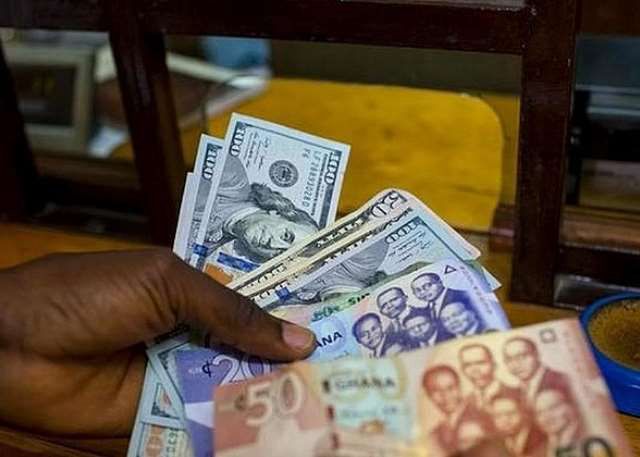The Ghanaian cedi exhibited a strengthening trend against the United States dollar on Wednesday, February 19, 2025, as reflected in the prevailing exchange rates across various market segments. Cedirates.com, a trusted source for currency information in Ghana, reported a buying rate of GHS15.34 per dollar and a selling rate of GHS15.79. This represents a marginal improvement for those acquiring dollars, with the buying rate decreasing by 2 pesewas compared to the previous day’s average. Conversely, the selling rate saw a slight increase of 1 pesewa. This fluctuation suggests a dynamic market with ongoing adjustments in currency valuations. The overall trend, however, points towards a favorable position for the cedi against the dollar.
Forex bureaus, which serve as vital access points for currency exchange for individuals and businesses, offered slightly different rates. Individuals exchanging dollars for cedis could obtain a rate of GHS15.50 per dollar, while those converting cedis to dollars faced a rate of GHS15.90. This difference, known as the spread, represents the bureau’s margin and reflects the costs associated with currency exchange operations. Compared to the interbank market rates, forex bureaus generally offer slightly less favorable rates, catering to smaller transactions and providing a more readily accessible exchange platform. This discrepancy highlights the varied landscape of currency exchange within the Ghanaian financial system.
The interbank market, where financial institutions trade currencies amongst themselves, displayed a tighter spread. The buying rate for dollars stood at GHS15.49, while the selling rate was GHS15.51. This smaller difference between buying and selling rates is characteristic of the interbank market, where large volumes are traded, and operational costs are distributed across significant transactions. The interbank market serves as a benchmark for currency valuation, influencing the rates offered by other market participants, including forex bureaus and money transfer operators. The cedi’s performance against the dollar in this market signifies broader economic trends and investor sentiment.
Exchange rates for other major currencies, such as the British pound and the euro, also experienced fluctuations. Average exchange rates for the British pound were GHS19.26 for those exchanging pounds for cedis and GHS19.94 for those converting cedis to pounds. Similarly, the euro traded at GHS15.93 for exchanging euros for cedis and GHS16.58 for converting cedis to euros. These rates reflect the relative strengths and weaknesses of these currencies against the cedi, influenced by international market forces and specific economic conditions within the respective currency zones. The spread between buying and selling rates for these currencies also varied, mirroring the dynamics observed in the dollar exchange market.
The Bank of Ghana’s interbank market provided further insights into the official exchange rates for the pound and the euro. The pound was selling at GHS19.55, while the euro was trading at GHS16.20. These rates, set by the central bank, serve as a reference point for the broader market and influence the exchange rates offered by commercial banks and other financial institutions. The Bank of Ghana’s role in regulating and monitoring the foreign exchange market is crucial for maintaining stability and ensuring transparency within the financial system. The official rates reflect the Bank of Ghana’s assessment of the cedi’s value relative to these major currencies, taking into account various economic factors and policy considerations.
Money transfer operators, such as LemFi and Afriex, offered competitive rates for remittances from the US or the UK to Ghana. For dollar transfers, LemFi provided a rate of GHS15.39 per dollar, while Afriex offered GHS15.37 per dollar. For British pound transfers, LemFi’s rate was GHS19.37, and Afriex offered GHS19.84. Euro transfers through Afriex were priced at GHS16.06 per euro, while LemFi offered GHS16.09. These rates reflect the specialized services offered by these platforms, catering to the needs of individuals sending money across borders. The competitive landscape within the remittance market benefits consumers by providing options and potentially lower transfer costs. The rates offered by these platforms are influenced by the prevailing interbank market rates but also incorporate their operational costs and profit margins.
Finally, for digital subscription payments using Visa and Mastercard for services like Netflix, Spotify, or Apple Music, the exchange rate was set at GHS16.64 per dollar. This rate reflects the specific agreements between these international service providers and payment processors. It may differ slightly from the prevailing market rates due to factors such as processing fees and currency conversion charges. The standardized rate for digital subscriptions provides clarity for consumers regarding the cost of these services in local currency. The exchange rate for these transactions demonstrates the increasing integration of digital services into the global economy and the corresponding need for transparent and efficient payment mechanisms. Overall, the Ghanaian currency market exhibited dynamic activity on February 19, 2025, with the cedi demonstrating relative strength against the US dollar and fluctuating against other major currencies. The diverse range of exchange rates across different market segments reflects the intricacies of the financial landscape and the varying needs of individuals, businesses, and international service providers.


